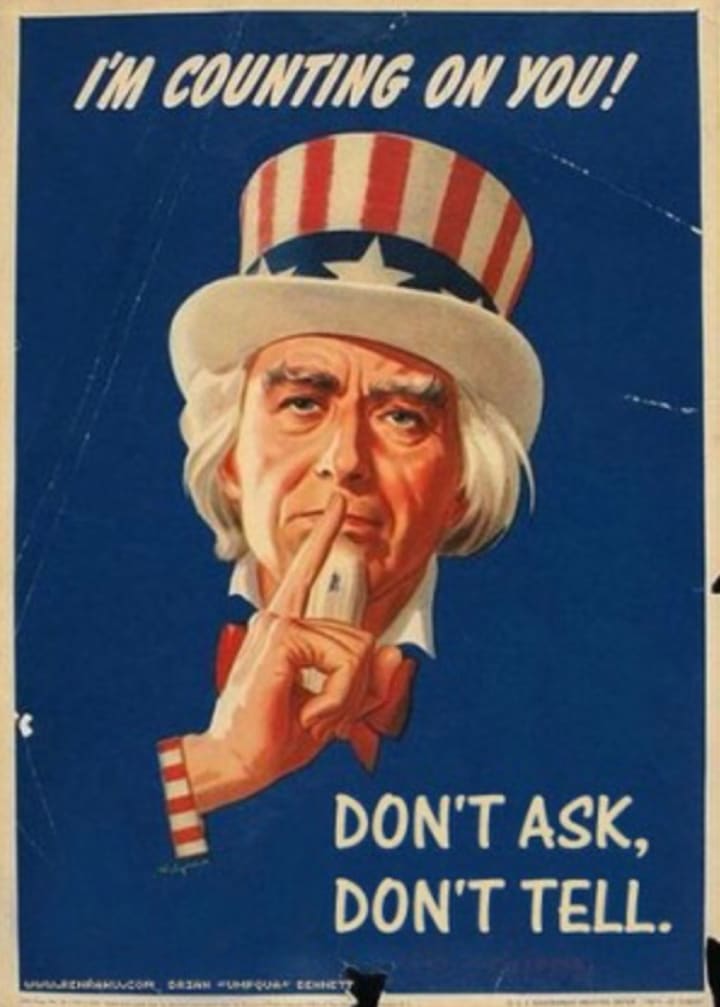The History of "Don’t Ask, Don’t Tell"
Just what went down for the "Don't Ask, Don't Tell" policy? Check out the timeline of the history of "Don’t Ask, Don’t Tell" incident.

"Don’t Ask, Don’t Tell" (DADT) was the official United States policy towards the military service by gays, lesbians, and bisexuals that was instituted by the Clinton Administration on February 28, 1994. This occurred when the Department of Defense Directive 1304.26 was issued on December 21, 1993 and took effect, lasting until September 20, 2011. This policy basically prohibited military personnel from distinguishing or harassing closeted homosexual or bisexual service members while keeping their sexual orientation away from serving in the military.
This policy also forbid service members from engaging in homosexual acts while in any of the US Armed Forces. The reason for this is because their presence “would create an unacceptable risk to the high standards of morale, good order, and discipline, and unit cohesion that are the essence of military capability.” Overall, any service member who's bisexual or homosexual shouldn't act upon or even talk about their relationships. If so, they will be discharged from serving. So, if you're curious how all of this went down, check out the full history of "Don’t Ask, Don’t Tell" and led up to the Pentagon’s order.
December 21, 1993
On December 21, 1993, President Bill Clinton issues a directive ordering that all military recruit applicants shouldn’t be asked about their sexual orientation. With this, the policy became “Don’t ask, Don’t tell.” This is in regard to his promise in 1992 when he allowed all citizens, despite their sexual orientation, to join the military.
Commander Craig Quigley, a Navy spokesman, conveyed the opposition of many in the military during the time mentioning that homosexuals are “notoriously promiscuous” and that even with shared showering situations that heterosexuals would feel uncomfortable. Even with this in mind, the policy was still issued and it was forbidden that anyone speaks of their sexual orientation. This also goes for acting it out and engaging in it.
October 18, 2004
Then in 2004, a gay activist group called the Log Cabin Republicans sues the US government under the Bush administration over the "Don’t Ask, Don’t Tell" policy. They claimed that the policy literally violates the constitutional rights of gay and bisexual service members. They even went on trial for this incident.
From the history of "Don’t Ask, Don’t Tell," the government argues back that DADT was very necessary to advance a legitimate governmental interest. Even statements by President Barak Obama was brought up that DADT “doesn’t contribute to our national security,” and “weakens our national security.” Also that the reversal is “essential for our national security.” These statements alone satisfied their burden of proof not the due process claims.
2008
Then comes 2008 and the Democratic presidential candidate Barak Obama pledges to completely bring the "Don’t Ask, Don’t Tell" policy to an end. This also leads to allowing openly gay men and women to serve in the armed forces. And the Obama administration declined to appeal when the Witt v. Department of the Air Force restored Witt’s substantive-due-process and procedural-due-process claims and affirmed the dismissal of her Equal Protection claim.
The Ninth Circuit, which analyzed the Supreme Court decision in Lawrence v. Texas (2003), determined that DADT would need to be subjected to heightened scrutiny. This means that there has to be an “important” government interest at issue that DADT has significantly further the government interest.
September 2010

As part of the history of "Don’t Ask, Don’t Tell," in 2010 after languishing on the court’s docket for about six years, the trial begins in the lawsuit that’s brought by the Log Cabin Republicans. The case is presided over by the US District Judge Virginia Phillips in Riverside, California. After looking through it, Judge Phillips rules in favor of the plaintiffs where the ban on service by openly gay service members was an unconstitutional violation of the First and Fifth Amendments. In other words, it violets free-speech and due-process rights of both gays and lesbians in the military.
The next day, September 21, there was a Republican-led effort to block repeal of the DADT Act that prevents the US Senate from overturning the law as part of a defense authorization bill. Then, a federal judge in Tacoma, Washington, commands the reinstatement of a former US Air Force Reserve Flight nurse, Major Margaret Witt, who was kicked out of the military after she exposed herself as being lesbian.
October 2010
On October 12, 2010, from the history of "Don’t Ask, Don’t Tell," Judge Phillips issues a permanent injunction discounting the United States military from enforcing this policy. However, on October 14, the Obama administration demand that it supports repeal of the ban. Yet, favoring a political solution over a court-imposed one, they ask the judge to raise her injunction while the case continues to remain under appeal. Even though Phillips denied it, the Ninth Circuit Court of Appeals granted it on October 20th and even stayed as a pending appeal on November first. Then the US Supreme Court refused to overrule the stay.
November/December 2010 and July 2011
On November of 2010, the Pentagon send out its report on “Don’t Ask, Don’t Tell,” and the repealing policy would pose little risk to military effectiveness. A high percent of service members believed that ending the policy would have mixed, positive, or no impact at all while those in the Marine Corps had negative views or concerns about overturning the policy. Then, US Senate Joe Lieberman and Maine Republican Senate Susan Collins brought forth in the US Senate a stand-alone bill that would repeal the DADT.
As part of the history of "Don’t Ask, Don’t Tell," President Obama praised the vote, and signed the bill on December 22. Before the law would pass, the Pentagon had a plan for implementing the repeal. This included updating a couple of policies and other regulations in addition to education and training programs for the troops.
Finally, as part of the history of "Don’t Ask, Don’t Tell," on July of 2011, Obama officially certified that the military was more than ready to completely demolish the DADT after Defense Secretary Leon Panetta and Joint Chiefs of Staff Chairman Adm. Mike Mullen signed off on the certification, as well. The repeal took effect on September 2011 after a 60-day time period.
About the Creator
George Nekilan
Has a vegetable garden in his backyard, 5th son out of 8 and is a sucker for chick flicks.






Comments
There are no comments for this story
Be the first to respond and start the conversation.